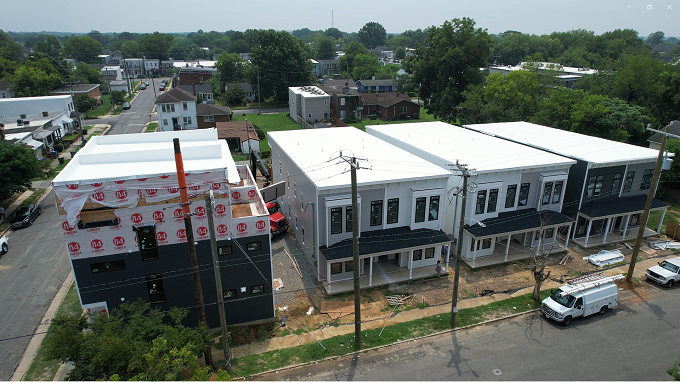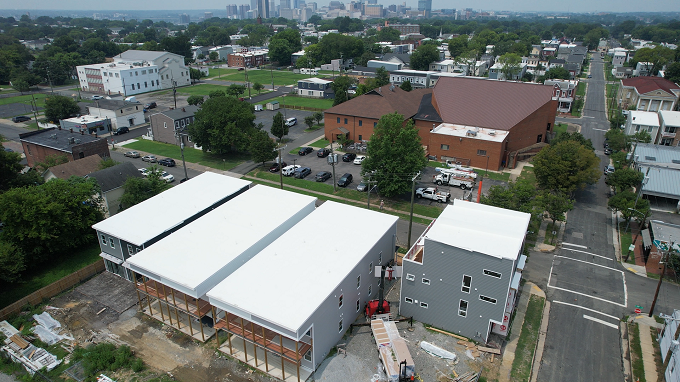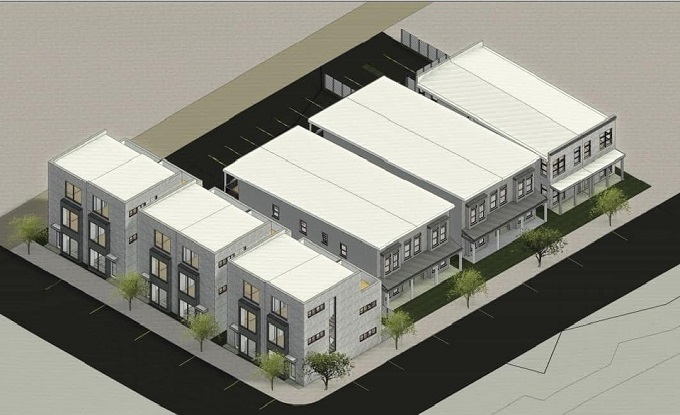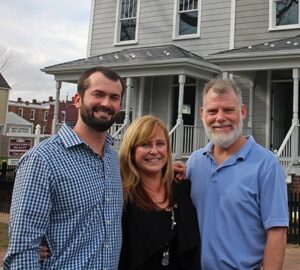
Construction is wrapping up on the first phase of an infill development that’s adding eight for-sale homes and four duplexes at the corner of 29th and R streets. (Images courtesy Daniil Kleyman)
After adding a baker’s dozen of apartments around the block, Daniil Kleyman is filling out another corner in Church Hill North with an infill development that’s set to add 16 more homes.
The prolific developer has teamed up with area builder Bryan Traylor on a project at the corner of 29th and R streets that’s replacing a former medical office building with eight for-sale townhomes and four duplexes containing eight rental units.
Traylor’s Unlimited Renovations is handling construction, and Kleyman said Traylor is a partner with him on the for-sale homes, which they’re developing under a separate LLC and plan to price in the mid-$400,000s. The rental units, developed under Kleyman’s Evolve Hld LLC, are pre-leased with rents at or near $1,900 a month.
Construction got underway earlier this year on the project’s first phase, consisting of the duplexes and four of the townhomes. The other four townhomes will make up a second phase that’s set to break ground this fall.

The two middle duplex buildings will include rear decks and are flanked by the townhomes, the taller of which will have top-floor terraces.
The roughly half-acre site is on the opposite side of the block from an earlier Kleyman project: a mixed-use development at 30th and Q streets that includes 13 apartments and a commercial space that’s home to restaurant Soul N’ Vinegar.
Kleyman said it was during that project that he saw that the single-story office building at 1127 N. 29th St. was for sale.
“It was vacant, sat on a big piece of land and made a lot of sense to redevelop into something more useful,” Kleyman said. “We went from a vacant office building to what will now become home to 16 different households. Much better use of land, more housing, a lot more tax revenue for the city and more people in the neighborhood.”
Kleyman said he purchased the property in January 2022 for $620,000. The property has since been subdivided into 12 lots, and online property records do not reflect the transaction or the seller. Long & Foster Real Estate had listed the property with an asking price of just under $800,000.
The city has assessed the six lots facing 29th Street at $68,000 each and the six facing R Street at $59,000 each, bringing the city’s total assessment for the site to $762,000.
Six of the townhomes will front R Street and rise three stories, while the other two townhomes and the four duplexes will be oriented toward 29th and rise two stories. The L-shaped configuration will enclose 14 on-site parking spaces behind the buildings.
The townhomes will range from about 1,700 to 1,800 square feet of space. Each will include three bedrooms and 3½ bathrooms, and the three-story units fronting R Street will include top-floor terraces. The 1,100-square-foot duplex units will have two bedrooms and bathrooms, with full-width front porches, two-story rear decks and facades designed to have the appearance from the street of single-family attached townhomes.
Construction on the first phase is set to wrap up next month, with the rest of the townhomes getting underway thereafter. The for-sale homes are being listed by Hometown Realty agents Matt Jarreau and Nancy Kuehl.
ADO’s Todd Dykshorn designed the homes, and Tracy Winkelman with Kine Vue Consulting is the civil engineer on the project. Mark Baker with Baker Development Resources handled Kleyman’s application for a special-use permit, which the City Council approved last year.
Kleyman wouldn’t share the total cost for the project, which is being dually financed. Old Dominion National Bank is financing the townhomes, and Touchstone Bank is financing the duplexes, Kleyman said.
When the SUP for the project received council approval, it also attracted about two dozen letters of support from area residents and property owners. Kleyman attributed the response to what he called a “dire need” for more housing and options in the neighborhood.
“Here we are able to create multiple entry points for people into the neighborhood: rentals and for-sale product,” he said. “And hopefully by now people are also familiar with the quality of everything we build. It’s usually additive to the area in terms of design and craftsmanship. We are also very hands-on property managers. Everything is managed in-house.”
The project adds to a hefty workload for Kleyman in and around Church Hill. His Evolve Development is developing nine townhomes on part of the Bowler Retirement Community property at 26th and M streets. Kleyman also is planning more than 100 apartments and three mixed-use buildings at Government Road and Glenwood Avenue, downhill from Chimborazo Park.
Uphill along Glenwood, Kleyman is planning to develop a 5-acre tract that he purchased two years ago. His completed projects in the area include the triangular mixed-use building he developed with Jarreau along Jefferson Avenue at 25th Street.

Construction is wrapping up on the first phase of an infill development that’s adding eight for-sale homes and four duplexes at the corner of 29th and R streets. (Images courtesy Daniil Kleyman)
After adding a baker’s dozen of apartments around the block, Daniil Kleyman is filling out another corner in Church Hill North with an infill development that’s set to add 16 more homes.
The prolific developer has teamed up with area builder Bryan Traylor on a project at the corner of 29th and R streets that’s replacing a former medical office building with eight for-sale townhomes and four duplexes containing eight rental units.
Traylor’s Unlimited Renovations is handling construction, and Kleyman said Traylor is a partner with him on the for-sale homes, which they’re developing under a separate LLC and plan to price in the mid-$400,000s. The rental units, developed under Kleyman’s Evolve Hld LLC, are pre-leased with rents at or near $1,900 a month.
Construction got underway earlier this year on the project’s first phase, consisting of the duplexes and four of the townhomes. The other four townhomes will make up a second phase that’s set to break ground this fall.

The two middle duplex buildings will include rear decks and are flanked by the townhomes, the taller of which will have top-floor terraces.
The roughly half-acre site is on the opposite side of the block from an earlier Kleyman project: a mixed-use development at 30th and Q streets that includes 13 apartments and a commercial space that’s home to restaurant Soul N’ Vinegar.
Kleyman said it was during that project that he saw that the single-story office building at 1127 N. 29th St. was for sale.
“It was vacant, sat on a big piece of land and made a lot of sense to redevelop into something more useful,” Kleyman said. “We went from a vacant office building to what will now become home to 16 different households. Much better use of land, more housing, a lot more tax revenue for the city and more people in the neighborhood.”
Kleyman said he purchased the property in January 2022 for $620,000. The property has since been subdivided into 12 lots, and online property records do not reflect the transaction or the seller. Long & Foster Real Estate had listed the property with an asking price of just under $800,000.
The city has assessed the six lots facing 29th Street at $68,000 each and the six facing R Street at $59,000 each, bringing the city’s total assessment for the site to $762,000.
Six of the townhomes will front R Street and rise three stories, while the other two townhomes and the four duplexes will be oriented toward 29th and rise two stories. The L-shaped configuration will enclose 14 on-site parking spaces behind the buildings.
The townhomes will range from about 1,700 to 1,800 square feet of space. Each will include three bedrooms and 3½ bathrooms, and the three-story units fronting R Street will include top-floor terraces. The 1,100-square-foot duplex units will have two bedrooms and bathrooms, with full-width front porches, two-story rear decks and facades designed to have the appearance from the street of single-family attached townhomes.
Construction on the first phase is set to wrap up next month, with the rest of the townhomes getting underway thereafter. The for-sale homes are being listed by Hometown Realty agents Matt Jarreau and Nancy Kuehl.
ADO’s Todd Dykshorn designed the homes, and Tracy Winkelman with Kine Vue Consulting is the civil engineer on the project. Mark Baker with Baker Development Resources handled Kleyman’s application for a special-use permit, which the City Council approved last year.
Kleyman wouldn’t share the total cost for the project, which is being dually financed. Old Dominion National Bank is financing the townhomes, and Touchstone Bank is financing the duplexes, Kleyman said.
When the SUP for the project received council approval, it also attracted about two dozen letters of support from area residents and property owners. Kleyman attributed the response to what he called a “dire need” for more housing and options in the neighborhood.
“Here we are able to create multiple entry points for people into the neighborhood: rentals and for-sale product,” he said. “And hopefully by now people are also familiar with the quality of everything we build. It’s usually additive to the area in terms of design and craftsmanship. We are also very hands-on property managers. Everything is managed in-house.”
The project adds to a hefty workload for Kleyman in and around Church Hill. His Evolve Development is developing nine townhomes on part of the Bowler Retirement Community property at 26th and M streets. Kleyman also is planning more than 100 apartments and three mixed-use buildings at Government Road and Glenwood Avenue, downhill from Chimborazo Park.
Uphill along Glenwood, Kleyman is planning to develop a 5-acre tract that he purchased two years ago. His completed projects in the area include the triangular mixed-use building he developed with Jarreau along Jefferson Avenue at 25th Street.






Daniil is right about the quality of his work. He cares about the final product and how it fits in the community. He’s made a home on Union Hill and done a service to that neighborhood.
Awesome, I am so glad to hear they are building HOMES and not apartments! Yes!
More accurately stated, Kleyman is building both – townhomes and apartments. It’s a good mix that will go a long way toward adding vitality to pockets of the East End. As Bruce stated, his projects are quality efforts. Very glad to see at least a few of vast number of developable parcels in the East End are in Kleyman’s capable hands, and I’m looking forward to his entire array of projects coming to fruition over the next few years.
$1900 for rental; most like $2400 for a buyer’s mortgage. $100k+ in household income most likely need to be eligible for either. City’s AMI for two person household is just over $85k. Funny NOT one unit could have been split or set aside to help create affordability for the existing residents especially those renters looking to buy. Oh well let the gentrification lines keep moving and call it progress.
So new constructions costs quite a bit. Especially when built on parcels with the land value the city is currently assessing in neighborhoods like this. Interest rates are high. The rates the trades charge are high. I don’t see any new construciton homes/townhomes on the market inside the 295/288 ring you’d probably call affordable for the median unless they are <=1300SF. Do you think developers should builder small homes on these lots zoned for more? Or do you believe that the developers can provide the same ?>=2000SF new construction product at a much lower sticker price just set aside for… Read more »
Agreed Michelle so why not set aside 1 of the dozen plus units to Maggie Walker Trust to “deduct” land cost from the sale prices (which also means long term affordability with the unit) and instead of one 2000SF new place split that one row homes into two units. As an incentive developer can be allowing to squeeze in a larger unit on two of the parcels or get a rebate on new utility connections fees. I am not saying it is required but will ALL this talk there seems to be little action both with developers or the City… Read more »
Sounds like you want Richmond to become Pittsburgh or Detroit. “Gentrification” means that a place is growing and improving.
That is not the complete story of gentrification. It also means displacement, even moreso than growth and improvement.
i agree there is displacement when gentrification happens, but I am curious to understand what your solutions would be. (no disrespect, I just want to hear another side.)
This is replacing a parking lot and a low-rise office building with 16 residential units. Given the city must accomodate growth it seems like a good market-driven infill project in the current climate. And as others have said Daniil does make a quality product built to last as he holds onto the rentals he builds and understands devoting resources to getting soundproofing done upfront will lead to less tenant turnover. I live in Church Hill and am glad to see area above M Street gain momentum on development. Many of these blocks were 50/50 in terms of land with houses… Read more »
Paul – you make some very solid points. I would offer the following counterpoint to your final argument in favor of small buildings vs large 300+ unit buildings: RVA, as a growing city, needs both the smaller and larger developments. For neighborhoods such as yours and where Daniil is building in the East End, the smaller buildings such as townhouses, duplexes and limited-scale apartment buildings work well. However, I absolutely do NOT want to see this kind of limited-size construction become the norm city-wide. Small construction like these townhouses or duplexes in districts such as Scott’s Addition, Manchester and Monroe… Read more »
Sure. Context matters. There is no one size fits all solution. If you need me to add more nuance to my comment I’d say what’s the nature of the surrounding neighborhood? If its block after block of rowhouses and other narrow lot homes plus 1880-1940 main street commercial style buildings then I’d rather see infill that increases the density without becoming monoliths. Missing middle is what some call it. What Daniil has been doing mostly fits the bill for me (other than maybe not loving architecture on some of them but perfect can’t be the enemy of the good). I… Read more »
Overall, I think we’re in agreement most of the way. To your final point: I’m a huge proponent of best/highest possible use for a given parcel, particularly from an urban planning perspective. I’m not at all in favor of land-banking and consolidating an entire city block only to have a developer put a single building surrounded by – whatever – a plaza, open space, a low-rise atrium (witness the Dominion Tower – the entire north half of the block is a total wasteland of the short building with a flat roof. While I love the Canal St-facing tower, I can’t… Read more »
Unfortunately, as you point out, the market just isn’t there yet.
We’re not even Raleigh.
As I predicted years ago, Manchester will have the most development —- less people crying “Gentrification” and “History” and “Human Scale” at every turn over there.
Couldn’t have said it better, Shawn. And how sad is it that, nowadays, what was always little podunk Raleigh is pulling away from us like we’re not only standing still – but like we’ve got it slammed in reverse. Some 50 years ago when I was a kid, Raleigh – and for that matter, even Charlotte, were considered bush league vis a vis Richmond. Small time. Little towns. RVA was the “big” city. Charlotte and Raleigh were afterthoughts. Now? We’re eating their dust. It’s sickening to me that we have to face the reality that, indeed, we’re “not even Raleigh”… Read more »
As far as your Upper East Side dreams go, they don’t build em like that any more… and don’t forget that Manhattan is largely tall because …. the East River and the Hudson. Chicago is a weird case where no one wants to be anywhere except in a small area near the lake, and not too far South — even though technically there is PLENTY of room to build, there is a lot of human hostility in other parts of the city —- Richmond has PLENTY of space to grow outward, so going big, sorry, will take a long time.… Read more »
Unfortunately, you’re right as rain on this one, too. Going big – as in legitimately big – ain’t happening in my lifetime unless I live to be 100 – and I’m not placing any bets on that happening. I always envisioned Monroe Ward becoming the “miniature Upper East Side” exactly for the reason of proximity to “the ruvvah”. Franklin Street showed some real promise with quite a bit of development in the 1960s and early ’70s – but that went by the wayside and the preservationists stepped in and started slapping every piece of land within sniffing distance of Franklin… Read more »
>> We shouldn’t settle for anything less than reaching for the stars. Maybe in the CBD. But you’re ascribing the need for high rises in pretty much every neighborhood you cite except Church Hill. In a city with modest growth not rapid growth pegging the goals to be hi-rises is essentially resigning the city to having landbanking and surface lots for many more decades. I do wonder if you’ve lived anywhere that actually has many hi-rises in your life? And if you did was it actually downtown as an adult and not a college student? Because I did from 99-thru-13.… Read more »
I recall either earlier this year or late last year a developer who purchased land maybe 4 to 5 years ago and went thru the process to get some approvals on his site plan then sold the lot to an out-of-state developer. The usual suspects in the BizSense applauded this as if this was a great outcome. For whom? The landbanker I guess. I think many avid readers of this business site are people who are connected the real estate industry who are fans or anyting that yields somebody a commision or gets an ROI on capital withe the least… Read more »
Paul – to which site are you referring?
Seriously? A downvote for asking for clarification and specifics in order to discuss a project? Wow…
Ha! lol! welcome to my world!
Does living in Chicago and (briefly) in New York (in Brooklyn) in my 40s and 50s count as living anywhere else and not as a college student?
I agree, however if they want to really make it affordable, a 30-50 unit condo complex in addition would make a huge difference.
If we want affordable housing, we need more units, whether apts or SFH or condos — more supply brings the prices down eventually, until the next cycle.
Where the money comes to build them doesn’t matter — but it is a VERY good thing that Richmond attracts money from places like New York, etc — what is the alternative??? Fairy dust?
Some of the commentors seem to like to make the perfect the enemy of the good, and perfect doesn’t exist.
We are lucky that out of towners find it more attractive to build here than where they are located.
I don’t think anyone in this conversation is saying to flat out refuse out-of-state money. Some of us are just saying that when you set expectations that hi-rise buildings or mega master planned development is the only best and highest use of our precious land resources then you end up waiting and waiting for market conditions and a deep pocket savior. Usually one from Out-of-state. Then begins attempts to rake the city for concessions and subsidy. Haggling with upzoning. And in end even if that out-of-state developer eventually delivers the final product all the rents funnel to their out-of-state shareholders.… Read more »
The thing is, Richmond is organically attracting out-of-state developers to come here and invest. Why would we NOT want an Avery Hall to invest millions of dollars in Manchester? Even those initially in opposition to the project (with the exception of a handful attached to Legends brewery who were dug in at the heels) actually started doing the math and came to the conclusion that Avery Hall investing in a couple of residential towers is actually made good economic sense for Manchester — and they turned around and voiced support for the project. Folks clamor constantly about wanting a grocery… Read more »